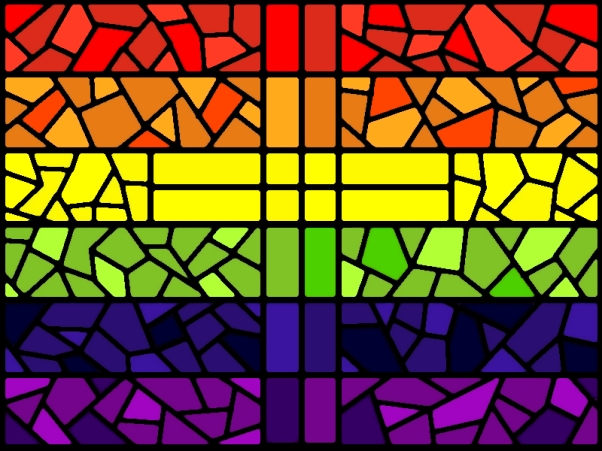Posted by Wayves volunteer 16/02/2014

With 20% (6/35) of participants identifying as coming from either non-faith or non-Christian backgrounds, Christianity still looms large place in the respondents' experience and in the report itself. (Wayves Editor)
By J.J. Lyon
Wayves' publisher Dan MacKay asked if I'd write something about the presentation and discussion on LGBTQ Spirituality that took place on Sunday, February 9 at the Spring Garden Library in Halifax, (Ed.'s Note: Read more about this event on Wayves.ca). Researchers Breanda Beagan and Brenda Hattie ("The Brendas) have considerable experience around researching LGBTQ health issues, and this project grew out of significant responses s significant in previous studies.
I am happy to share with you what I learned, and what I felt were significant issues. However, I am neither an academic, nor a scholar, but just another member of the LGBTQ community dealing with his own issues of loss and betrayal. Reading the report made me very sad that I was unable to participate in this research project.
The twenty-four page report is broken down into well presented sections, and very insightful in its handling of respondents' personal statements. One gets a very real sense of being there, and hearing the pain, the struggle, the resolution and the growth.
The first section of the report gives a breakdown of the 35 interview subjects: "[They] ranged in age from 20 to 68, with 11 in the 20-30 age group, 13 in the 31-50 age group and 11 in the 51+ age group. About ⅔ were Caucasian, and ⅔ were raised in Atlantic Canada. There were 19 women, 11 men, 4 transgender or gender queer, and 1 other gender; 21 identified as gay or lesbian, 4 as bisexual, 7 as queer, 1 as heterosexual and 2 as other."
The researchers sub-divided those identifying as Christian into two groups. "Among the Christian participants, we have categorized people as having been raised ‘intensely’ or ‘somewhat’ Christian. This is a distinction we have imposed, not their words. The 11 participants we consider raised ‘somewhat’ Christian grew up with organized religion, ... [but] were not very involved beyond that, and typically did not have much if any discussion of religion at home. ... The 18 participants we categorize as raised ‘intensely’ Christian ... were heavily involved {in their faith communities], usually in youth groups, choir, Bible study. They led church camps, were altar boys, became church elders or deacons, studied theology, and so on. Religion was usually talked about at home, and often was central to family, schooling and community."
Perhaps one of the most surprising conclusions to emerge from this study is that, despite the age range among participants (20 to 68), there does not appear to be a difference in the number or the intensity of negative experiences. One might have thought that a drop in the attendance at churches and the opening of dialogue with the community at large, by some faith groups, would have made for a better experience for younger LGBTQ members, but that does not seem to be the case.
Participants whose religious communities had a strong sense of “sin” or “transgression” had significantly more issues to deal with and problems to overcome. The use of banishment from the community seems to have had a significant effect, especially when added to separation from family and condemnation in the workplace. Various attempts to deal with these complicated issues came up in the interviews, and the discussion of how one can deal with the crushing loss of identity and community were very revealing; these included delaying sexual activity, sex-negativity, denying one's identity, trying to be “healed”, severing relationships, loss of family, health issues related to drugs and alcohol, cutting and hurting oneself,
Later sections of the report deal with approaches to spirituality that proved helpful for some of the participants. One person, having doneconsiderable study in Theology, learned that the whole issue of sexuality is a bit ambiguous, at best. The whole issue of whether or not “spirituality” is the sole property of “organized religion” is explored with some respondents finding new avenues to explore, or by being selective about the weight that they give to the teachings of their birth religion. Another approach was to separate the two issues and see spirituality as a more personal, natural thing, an individual responsibility and journey, and that the acceptance of one's own sexual reality could not be separated from a sense of spirituality
The final sections bring the issue back to the community itself. The survey reports on the difficulty some participants had with being open about spirituality and/or religious observance within the LGBTQ community; for some this was yet another banishment. For others the hurt that they'd experienced would not allow them to even open the subject for discussion. Many felt that the community would be enhanced if these conversations could more easily take place in the LGBTQ community. In concluding, the report asks the question: How do we move to a better place as a community?
About 20 or so people attended the presentation at Spring Garden Library. Ms Hattie gave a brief overview of the project, then we split into small discussion groups. We were asked to comment on the general findings of the study as outlined above, offering a chance a chance to guage the general feeling in this group. Perhaps catching our researchers a little off guard, was the suggestion that more gatherings should be held and more opportunities found to have meaningful discussion on this topic. Monthly meetings were rather quickly dismissed, but the concept of meeting every quarter, or semi-annually, was left open.
Editor's Note: J. J. Lyon is an ordained minister, and a founder of Halifax's (now-inactive) Safe Harbour Metropolitan Community Church. He frequently speaks and writes about religious issues, particularly about the Bible and Christianity with respect to LGBTQ people.

